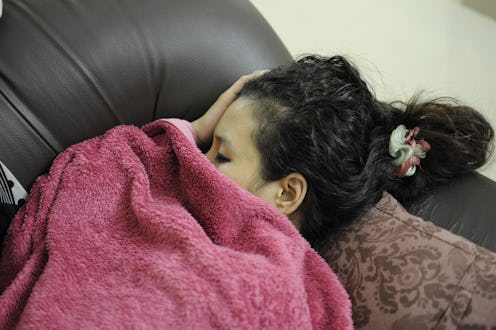Life
4 Reasons Not To Sleep In This Winter

The lure of an extra few hours of sleep is a strong one, especially when it's freezing outside and you've got nowhere you're supposed to be. But evidence is mounting that it's bad to sleep in, and that sleeping in might be messing with your system more than you know.
The latest disappointing news about sleeping in comes to us from the Journal of Clinical Endocrinology & Metabolism, which published a study of over 400 participants who went to sleep and woke up later on the weekends than on workdays. Unfortunately, as reported in the New York Times, "sleeping late on days off was linked to lower HDL (good) cholesterol, higher triglycerides, higher insulin resistance and higher body mass index" in the experimental participants — even after controlling for a variety of other health factors.
In other words, changes in sleep pattern really do seem to trash your metabolism and cardiovascular system, which are of course essential for good health. If that weren't enough reason to stop sleeping in on its own, there are even more reasons to worry about.
Disrupted Sleep Patterns Might Give You Alzheimer's
Though further research is definitely required, studies now indicate that disrupted sleep patterns (like jet lag) impair memory and give you Alzheimer's-like symptoms. It's possible that sleep cycle problems precede and contribute to Alzheimer's disease then, instead of being just a symptom of it. Though it's totally worth it to risk a temporarily disrupted sleep cycle to, say, visit Europe, ordinary sleeping in probably isn't pleasurable enough to risk an increased chance of Alzheimer's by doing it every weekend.
Sleeping In Can Mask Your Seasonal Affective Disorder
Are you sleeping in for fun, or do you have genuinely disturbed energy levels? The latter can be a symptom of seasonal affective disorder, so you need to be honest with yourself every time you hit that snooze. There isn't much to lose by attempting not to sleep in, because it's bad for you in other ways too, and if you really can't stop you might need to think about treating your seasonal affective disorder directly.
You'll End Up With A Sleep Hangover
Does sleeping in even feel that good in the first place? Though the extra time you spend actually in bed might be great, if you experience a "sleep hangover" after sleeping in, you're definitely not alone. When your body was expecting wake up, it prepared itself for a morning surge of energy, but you weren't awake to experience it. So the ill effects of sleeping in can begin right away, not just far in the future.